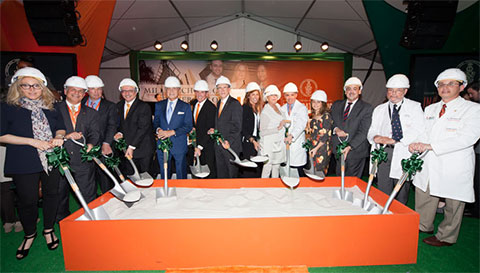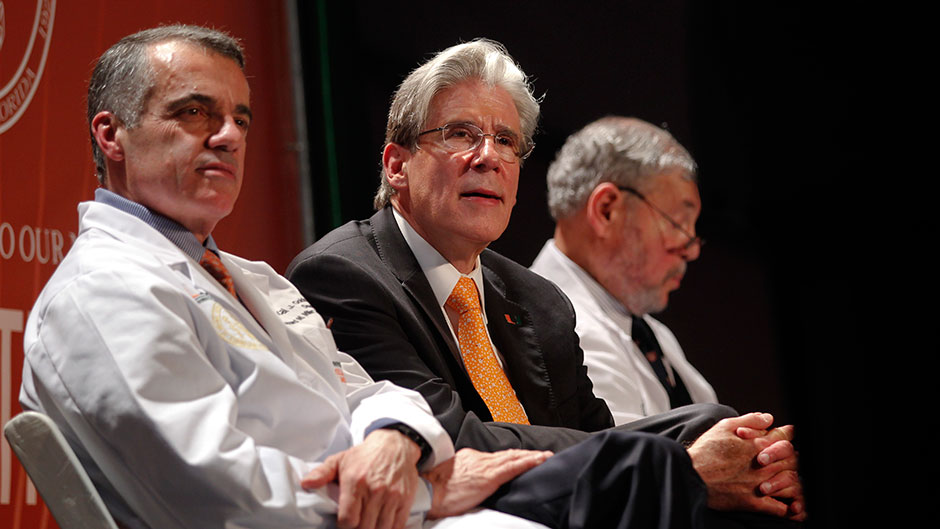More than six decades after its founding, the Miller School of Medicine, along with UHealth - the University of Miami Health System, are vital parts of the University of Miami’s mission, said Julio Frenk at a Thursday medical campus celebration a day before his formal inauguration as the University’s sixth president.
“A great medical school and a great academic health system are core components of a great university,” Frenk said. “They embody two of our greatest aspirations – excellence and relevance – and they are perhaps the most visible face of our University’s service to the community.”
Pascal J. Goldschmidt, M.D., Dean of the Miller School, hosted the celebration, “A New Century of Medical Education and Innovation,” which brought together hundreds of people from the Miller School and UHealth, University leadership including deans of other schools and colleges, South Florida community health leaders and civic officials. “I am delighted that Dr. Norman Kenyon, president of the medical school’s first graduating class of 1956, is with us today,” Frenk said. “The school’s founders were committed to educating a new generation of medical leaders, just as we do today.”
The celebration on the Schoninger Research Quadrangle included a ceremonial groundbreaking for a new medical education building and the renaming of the clinical research building, both made possible by major gifts from the Miller and Soffer families, who have strong ties to UM and the Miller School. “These remarkable acts of generosity are enabling the Miller School to position itself to meet and exceed 21st century challenges,” said Goldschmidt.
In his address, Frenk emphasized the importance of integrating research, clinical care and medical education in a sustainable, value-based, translational health system. “We cannot thrive without the generous support of our friends and donors, many of whom are with us today,” he said. “We cannot succeed without the trust of our patients who look to us for a future filled with hope and health. Working together, we will lead the way into a new century at the University of Miami and a new era in education, research and health care.”
A new Center for Medical Education
After Frenk’s talk, a groundbreaking ceremony was held for the Miller School of Medicine Center for Medical Education. This leading-edge building, which will incorporate numerous innovative technology features, was made possible by a $50 million gift from the family of Stuart A. Miller, Chair of the University of Miami Board of Trustees, that continues the Miller family’s ongoing support for both UM and the Miller School.
 In 2004, the Miller family gave a historic $100 million gift to name the School of Medicine in honor of the late Leonard M. Miller, a UM lifetime trustee and former chair of the UM Board of Trustees. Additionally, in 2014 The Lennar Foundation, which was founded by Leonard Miller as the charitable arm of the Lennar Corporation and is led by Chairman Marshall Ames, contributed $50 million to name The Lennar Foundation Medical Center, the newest home of UHealth being built on the Coral Gables campus.
In 2004, the Miller family gave a historic $100 million gift to name the School of Medicine in honor of the late Leonard M. Miller, a UM lifetime trustee and former chair of the UM Board of Trustees. Additionally, in 2014 The Lennar Foundation, which was founded by Leonard Miller as the charitable arm of the Lennar Corporation and is led by Chairman Marshall Ames, contributed $50 million to name The Lennar Foundation Medical Center, the newest home of UHealth being built on the Coral Gables campus.
“Both our family and the Soffer family recognize the importance of giving back to our community, and we strive to lead by our actions,” said Stuart Miller. “We look forward to continuing that legacy of philanthropy.”
Noting that current students at the Miller School will be working in a very different health system when they graduate, Frenk said, “As one of the nation’s top-tier medical schools, we must ensure that our methods of medical education help drive those changes. As a physician and educator, it is thrilling to witness the innovation we are embracing for both our students and faculty.”
After unveiling a conceptual drawing of the new center, Laurence B. Gardner, M.D., Miller Professor and Executive Dean for Education and Policy, said, “This building will incorporate robust technology features, flexible workstations and the largest auditorium on the medical campus. It reflects the Miller School’s unwavering commitment to transform lives through teaching, research and clinical service.”
Naming the Don Soffer Clinical Research Center
In another demonstration of support for the medical innovation on the Miller School campus, members of Don Soffer’s family were recognized for their foundation’s $25 million commitment to the Interdisciplinary Stem Cell Institute (ISCI) – the largest single donation the Institute has ever received. The funding will allow the Institute to continue its groundbreaking stem cell research in several areas, supporting the exploration of therapies in the fields of cardiology, sports medicine and aging-related frailty.
In recognition of this seminal gift, the Clinical Research Building has been renamed the Don Soffer Clinical Research Center. “We thank you for honoring our family,” said Don Soffer. “We know that ISCI is in the forefront of research on stem cells, which are the foundation of life.”
Thanking the Soffers for their support, Frenk said, “Our physicians and researchers are exploring and pushing forward the boundaries of scientific innovation through research that will lead to discoveries and better therapies, such as those we see at our Interdisciplinary Stem Cell Institute.”
Michael S. Gordon, M.D., and his wife, Lynda, sponsored the medical campus celebration and luncheon event. Dr. Gordon, a visionary academic and entrepreneur who joined the University of Miami faculty in 1966, revolutionized medical education around the world with the creation of Harvey, the world’s first cardiopulmonary patient simulator, and UMedic, an innovative computer and web-based program to train physicians, emergency responders and military personnel to save lives.
Before becoming UM’s first Hispanic president, Frenk served as the Minister of Health of Mexico from 2000 to 2006, and was the founding Director-General of the National Institute of Public Health in Mexico. Before joining the University of Miami, he was the Dean of the Faculty of the Harvard T.H. Chan School of Public Health since 2009, as well as the T&G Angelopoulos Professor of Public Health and International Development.

